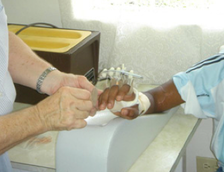Association of Caribbean Occupational Therapist

What is OT?
Occupational therapy is the art and science of enabling engagement in everyday living, through occupation; of enabling people to perform the occupations that foster health and well-being; and of enabling a just and inclusive society so that all people may participate to their potential in the daily occupations of life (Townsend& Polatajko, 2007, p. 372).
Occupational Therapy is a health care profession based on the knowledge that purposeful activity can promote health and well-being in all aspects of daily life. The aims are to promote, develop, restore and maintain abilities needed to cope with daily activities to prevent dysfunction. Programs are designed to facilitate maximum use of function to meet demands of the person’s working, social, personal and domestic environment. The essential feature of occupational therapy is the active involvement of the person in the therapeutic process. Occupational therapists receive education in social, psychological, biological and medical sciences, professional skills and methods. Fieldwork studies form an integral part of the course. (www.wfot.org)
What Qualifications do OTs Have?
The Occupational Therapist is a highly-trained health care professional who acquired a Bachelor’s or Master’s Degree from a WFOT recognised institution. Most of the North-American Universities are now requiring Master’s Degrees in OT.
To work in the Caribbean the OT has to be registered with the profession councils (name varies from country to country) of the country in which the professional wants to practice. Thereafter, the OT is strongly recommended to join the local association (is mandatory in some islands).
Where Do OTs Work?
OTs work with individuals of any ages and a variety of physical and/or psychosocial needs.
OTs are seen in hospitals, schools, community services, clinics, rehabilitation centers and workplace; in the public or private sector. They work in prevention as well as in acute, secondary and tertiary care.
What Happens When a Person is Referred to an OT?
Evaluations (through interviews, standardized tests, observation in various settings and consultation with significant others) are done initially to establish the client’s level of functioning and find the possible reasons for pain, delays and inability to carry out everyday activities, such as feeding, dressing, bathing, writing, etc.
Screening and assessing any of the following according to the client’s needs:
Treatment session frequency varies according to the identified problems. Unfortunately, at the moment, many of the OT services offered in the Caribbean are influenced by the limited amount of manpower, which makes it extremely difficult to provide the optimal frequency for treatment at times (e.g. every day or 3 times a week treatment)
Links to other OT websites
Occupational therapy is the art and science of enabling engagement in everyday living, through occupation; of enabling people to perform the occupations that foster health and well-being; and of enabling a just and inclusive society so that all people may participate to their potential in the daily occupations of life (Townsend& Polatajko, 2007, p. 372).
Occupational Therapy is a health care profession based on the knowledge that purposeful activity can promote health and well-being in all aspects of daily life. The aims are to promote, develop, restore and maintain abilities needed to cope with daily activities to prevent dysfunction. Programs are designed to facilitate maximum use of function to meet demands of the person’s working, social, personal and domestic environment. The essential feature of occupational therapy is the active involvement of the person in the therapeutic process. Occupational therapists receive education in social, psychological, biological and medical sciences, professional skills and methods. Fieldwork studies form an integral part of the course. (www.wfot.org)
What Qualifications do OTs Have?
The Occupational Therapist is a highly-trained health care professional who acquired a Bachelor’s or Master’s Degree from a WFOT recognised institution. Most of the North-American Universities are now requiring Master’s Degrees in OT.
To work in the Caribbean the OT has to be registered with the profession councils (name varies from country to country) of the country in which the professional wants to practice. Thereafter, the OT is strongly recommended to join the local association (is mandatory in some islands).
Where Do OTs Work?
OTs work with individuals of any ages and a variety of physical and/or psychosocial needs.
OTs are seen in hospitals, schools, community services, clinics, rehabilitation centers and workplace; in the public or private sector. They work in prevention as well as in acute, secondary and tertiary care.
What Happens When a Person is Referred to an OT?
Evaluations (through interviews, standardized tests, observation in various settings and consultation with significant others) are done initially to establish the client’s level of functioning and find the possible reasons for pain, delays and inability to carry out everyday activities, such as feeding, dressing, bathing, writing, etc.
Screening and assessing any of the following according to the client’s needs:
- Occupational Role
- Range of motion
- Sensory systems
- Muscle, grip and pinch strength
- Gross and fine motor skills
- Social and emotional skills
- Leisure and play
- Activities of Daily Living (ADLs)
- General Communication Skills
- General Cognitive Skills
Treatment session frequency varies according to the identified problems. Unfortunately, at the moment, many of the OT services offered in the Caribbean are influenced by the limited amount of manpower, which makes it extremely difficult to provide the optimal frequency for treatment at times (e.g. every day or 3 times a week treatment)
Links to other OT websites
- www.wfot.org (World Federation of OTs
- www.occupationaltherapyjamaica.com (OT Association of Jamaica)
- www.ttota.com (Trinidad and Tobago OT Association)
- www.caot.ca (Canadian Association of Ots)
- www.oeq.org (Ordre des Ergothérapeutes du Québec)
- www.aota.org (American OT Association)
- www.cot.co.uk (British OT Association and College of OTs)
- www.ausot.com.au (Australian Association of OTs)
- http://www.otasa.org.za (The Occupational Therapy Association of South Africa OTASA)
- www.otworks.ca (Provides information and resources on the profession of occupational therapy in Canada)
